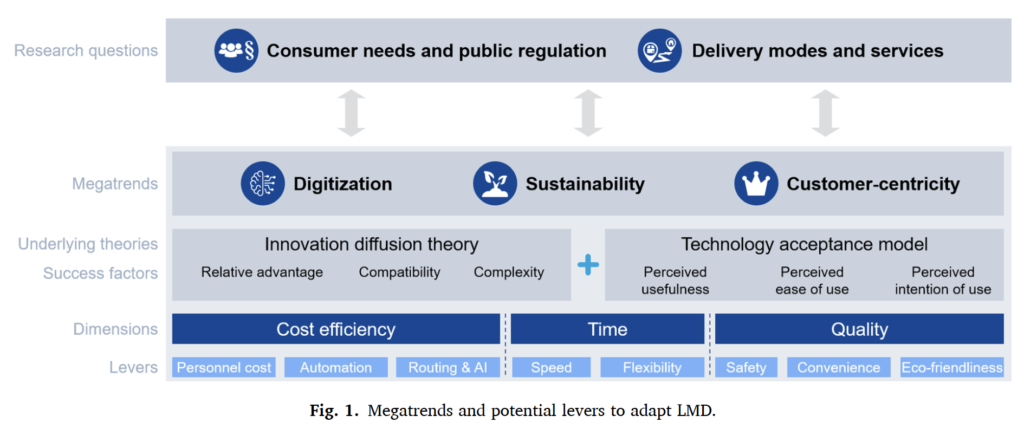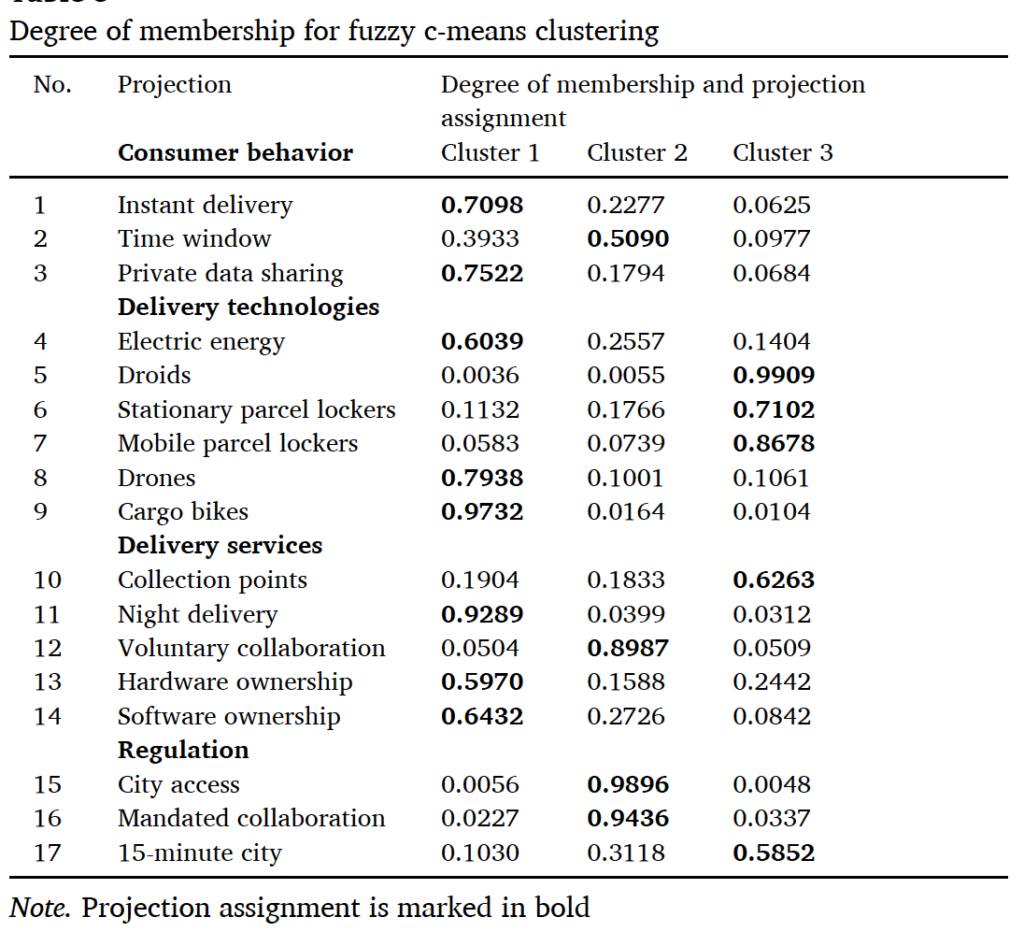In 2022 three Delphi studies (based on scenarios) were published about the future of last-mile innovations in urban areas:
The researchers developed projections of future consumer behavior, delivery technologies, delivery services, and regulation to validate them by conducting a two-round Delphi study among 36 experts from the LMD industry, academia, and politics. Based on the results, three future scenarios are identified by fuzzy c-means clustering, set within the context of innovation diffusion theory and the technology acceptance model.
There is expert consensus on the scope of technologies that will be used in 2040 and how consumers’ preferences may change, but the future design of delivery services is less certain. The identified scenarios provide managerial and policy guidance for logistics service providers, suppliers, municipalities, and e-commerce retailers to adapt their long-term strategies.

Scenario-cluster 1 illustrates the infrastructure and services scenario. Custer 2 highlights the possible future scenario regarding collaboration and regulation. Cluster 3 illustrates the scenario of recipient pick-up solutions containing projections with a comparatively low probability and a moderate effect if they do occur.

This study aims to identify plausible future states in last-mile logistics for mid-size European cities. It presents six scenarios for last-mile logistics in the year 2035 and identifies key themes policymakers should consider in addressing the uncertain future of last-mile logistics. The scenarios are developed using a Disaggregative Policy Delphi method.
This method enables the identification of scenarios through a cluster analysis of quantitative and qualitative assessments of possible future developments in last-mile city logistics by 26 participants in the expert panel. These experts are involved in last-mile logistics in the European cities of Bremen, Groningen, and Mechelen.
Six scenarios have been identified:
• Old Wild West – “No active government involvement and lack of incentives for innovation and cooperation.”
• New Wild West – “Last-mile logistics is shaken up, with high levels of innovation but low regard for sustainability.”
• New Cool Collective – “Shared beliefs and a shared course of action lead to sustainable last-mile logistics.”
• Revolution By Design – “Sustainability in last-mile logistics is reached by local authorities.”
• Thriving, Individually – “A mix of restrictive and facilitative policies spur technological innovation but result in limited cooperation between stakeholders.”
• Good Intentions Abound – “High levels of government initiative amidst low stakeholder cooperation and low market innovation.”
Comparing the scenarios results in three main overarching conclusions:
1. Logistics remains an integral part of inner cities. Despite changes in where and how logistics are operated, last-mile logistics processes will remain “a fact of city life,” omnipresent and closely interwoven with the urban.
2. Local governments are more active in setting directions for last-mile logistics development. Their role is essential in fostering cooperation and sustainability with the help of legal standards, access restrictions, facilitation of experiments, and partnerships with private initiatives. Logistics operations are still mostly up to the market.
3. A transition towards more sustainable city logistics is not a given. Substantial barriers are identified. Enabling pathways to sustainable last mile logistics requires a strong vision and policy implementation by local governments, societal pressure on reducing environmental impact and improving livability to foster cooperation between stakeholders, and introducing new technology and business models that embrace sustainability as their main principle.
The COVID-19 pandemic has highlighted the relevance of goods delivery in urban areas. However, this activity often generates a negative environmental impact, and several technologies have been proposed in recent years to reduce it, thus forming a complex innovation landscape characterized by different levels of maturity and effects on the City Logistics (CL) system. This complexity causes a deep uncertainty over the future of CL.
This paper aims to tackle this uncertainty by forecasting the future of a set of CL technologies. A Delphi survey has been submitted to experts to achieve a stable consensus over 33 projections related to 7 CL technologies for 2030. Technologies selected were in the area of Big Data Analytics (BDA), drones, intelligent transport systems, low-emission vehicles, crowd logistics, parcel lockers, Internet of Things and connected devices,
Results show that real-time data collection will help the coordination process between stakeholders, engendering an increased awareness of the value of using logistics data and its potential drawbacks. Moreover, experts share a positive attitude towards expanding parcel lockers, which should be monitored by public authorities to avoid a negative impact on land use. Finally, technologies such as drones and crowd-logistics have drawn the lowest level of consensus due to their lower level of maturity, which arouses the necessity to explore several further issues, such as legal and technical barriers.
Delphi studies in logistics
Quantitative and qualitative forecasting methods, such as econometrics or expert workshops, are available. However, the Delphi method is an established, proven methodology that can detect long-term trends. Since the 1950s, Delphi studies have been conducted in various disciplines, such as business, healthcare, and education. They are designed to reach reliable group opinions and are considered a valuable tool for forecasting future projections based on expert judgments. Delphi studies outperform conventional surveys because the expert panels have greater expertise and forecast ability.
Four core characteristics of Delphi studies are anonymity, iteration, controlled feedback, and statistical group response. Anonymity encourages all participants to express their points of view, which may differ from accepted opinions. The Delphi method also prevents study participants from being influenced by hierarchy or status as in round table discussions since the expert panelists are not located in the same place, additionally eluding financial and time constraints. In the course of iteration (i.e., at least two rounds), experts can revise their assessments without losing face. Experts receive controlled feedback after each round from the moderator so that they can interact with other study participants, enabling them to learn and adjust their evaluations. The statistical group response summarizes the study results in numerical and graphical presentations. The consensus achieved by the study participants can be measured by the interquartile range (IQR), and the change in standard deviation (SD) between Delphi rounds indicates the level of convergence.
Scenario planning
Scenario planning was invented to develop possible imaginations of the future called “scenarios.” Scenarios are coherent, understandable illustrations of potential future events that rely on multiple variables. Scenario planning is a disciplined method for imagining possible futures” to realize organizational strategies and decisions. For practitioners, scenario planning may be a valid method to investigate options with uncertain future outcomes. Scenarios are devised in a structured way to develop potential future situations, and these scenarios can be used as a basis for strategic planning. Thus, scenario planning encourages users to think about opportunities rather than uncertainty, allowing researchers and industry specialists to derive multiple scenarios describing the range of future eventualities.
Walther Ploos van Amstel.

I would like to draw attention to an interesting fact. In our own company, we have started modelling the development of new logistics projects aimed at saving resources using artificial intelligence. And the main advice we received was to develop the practice of using drones, as well as absolutely environmentally friendly vehicles that run on renewable energy sources. So we at Shipstage https://shipstage.com have already started developing analytics and business proposals in these areas.